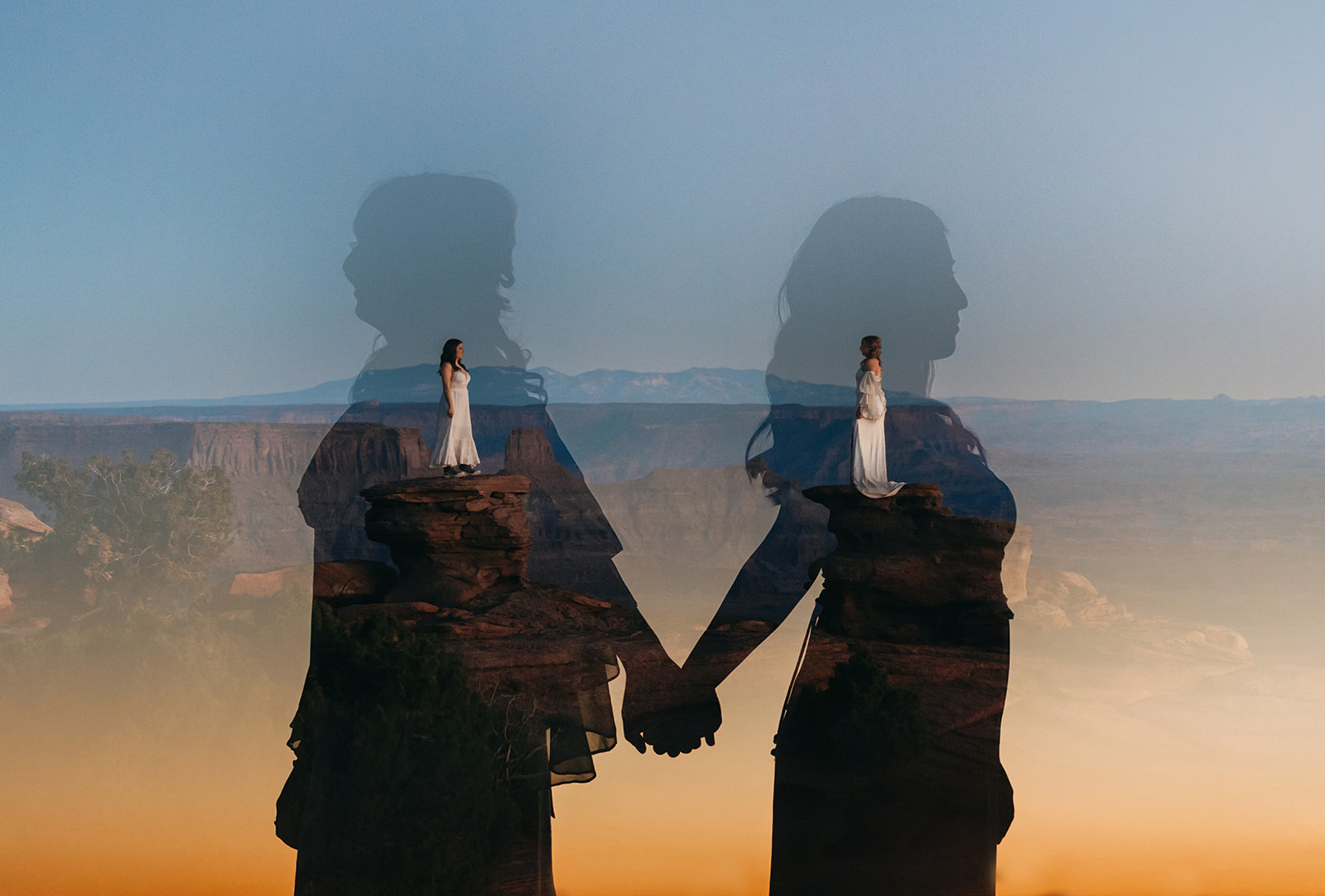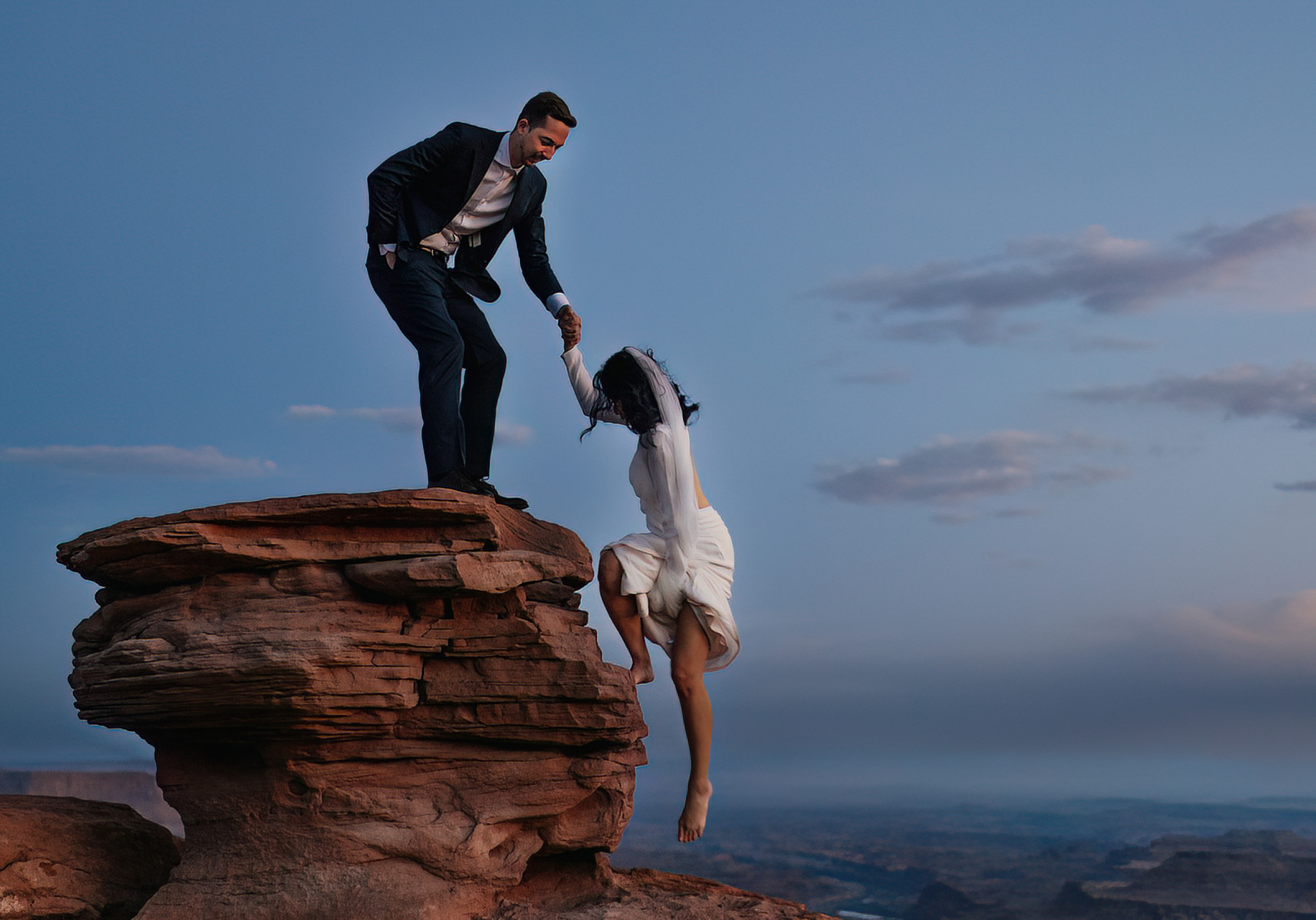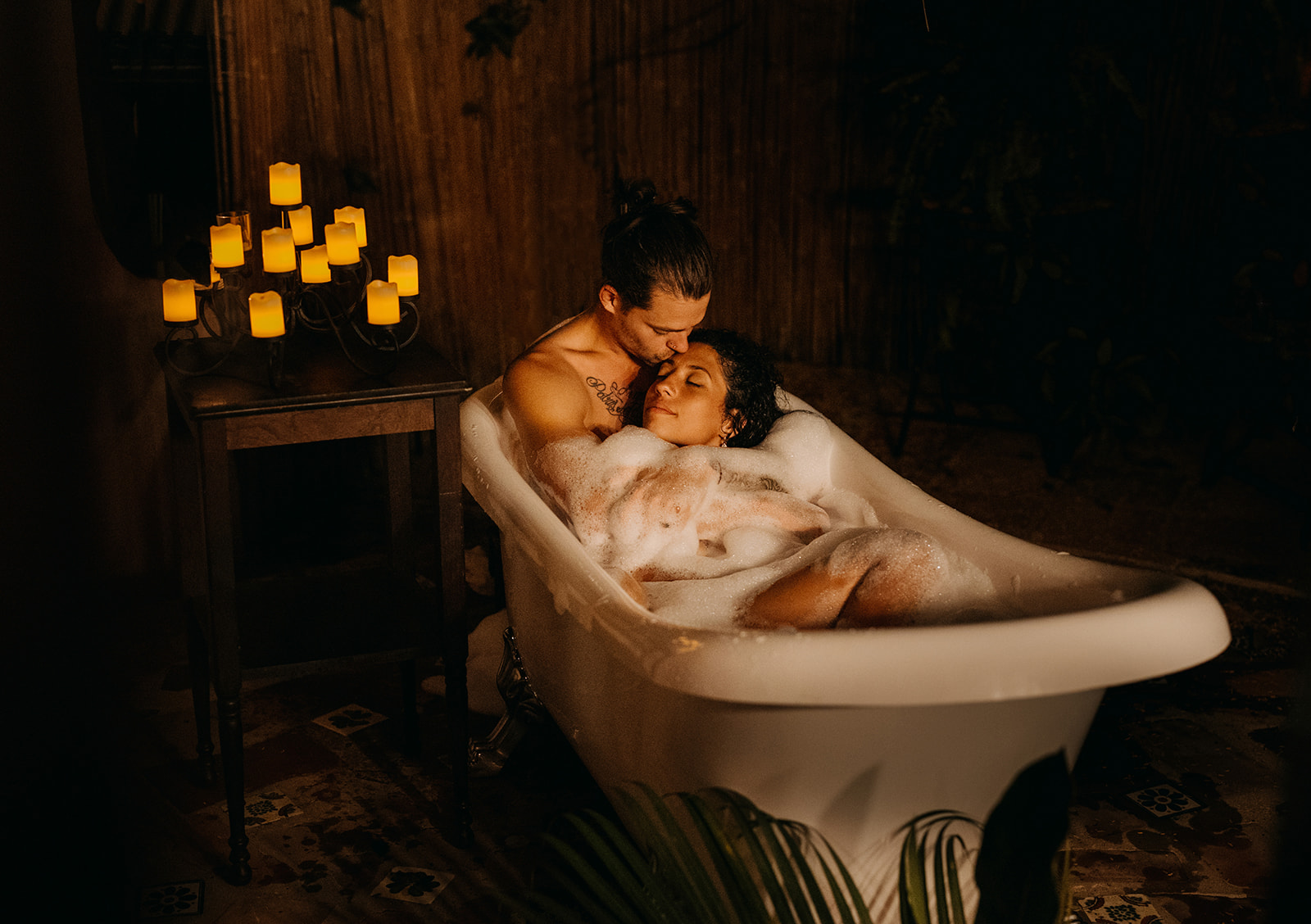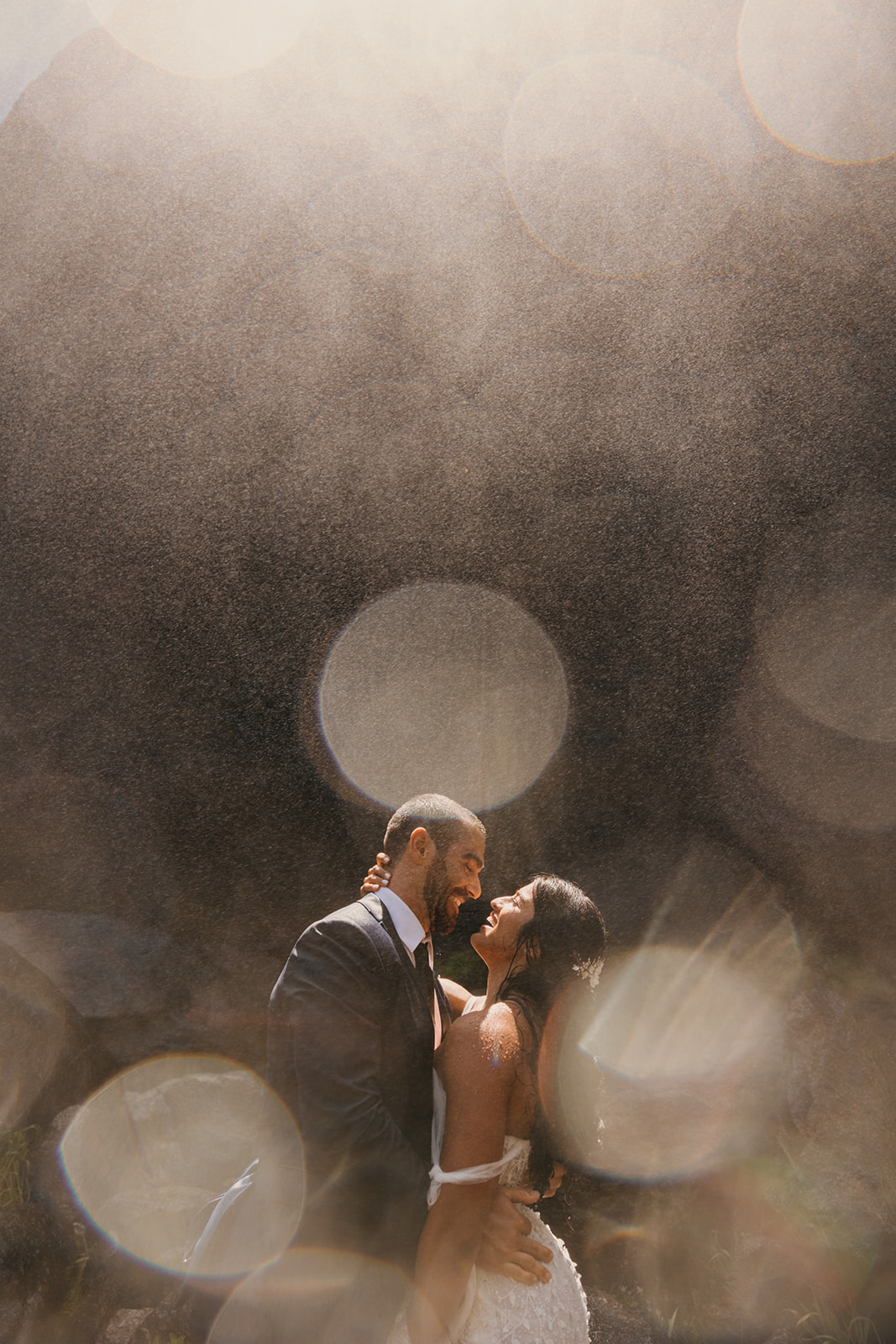Beyond My Lens: Photographer Katie Levine’s Storytelling Podcast, Supported by Narrative
Blog
By Kyle Wilson
Traci Edwards’ journey into the world of elopement photography began with a transformative trip to Iceland, where she captured a simple ceremony at the top of a waterfall at dawn. Since then, she has embraced a life of adventure, initially moving to Arizona and living full-time in a van to explore and learn about the most stunning elopement destinations across the West.
Now settled in Washington state with her husband —an integral member of the Adventure and Vow team—Traci continues to capture epic love stories on big adventures. Beyond her work, she is an avid outdoors enthusiast, passionate about hiking, backpacking, climbing, and canyoneering.
Traci is dedicated to creating authentic connections and providing couples with the freedom to express their true selves. She chatted with us about her passion for elopement photography, the evolution of her business, and how she balances the challenges and joys of a career rooted in adventure.
At what point does a wedding go from elopement to intimate wedding?
It's more about the intent versus how many people and all of that. Earlier this year, we shot a couple who did one day, just the two of them. And one day it was like 70 people at a venue, which isn't our norm, but it just transformed and we're like, well, we're fine with it. You're still doing all this for the right reasons and the things that matter still matter. So it varies.
What is it that excites you about shooting with people in adventurous places?
For me, it was the ability for people to freely express themselves. I had second-shot weddings previously and hated it every single time—I've seen brides bawling their eyes out or the groom is too drunk. Elopement felt very freeing. That was the first draw.

Did your journey into elopements organically evolve?
I was photographing under a commercial studio for Montana Pritchard in South Florida. I was his studio manager and first assistant for PGA of America. I was photographing golf, and then I went to Iceland where I saw an elopement and photographed it. It was like a 10-minute ceremony before the sun even came up. I came back and quit my job and was like, I'm going to be an elopement photographer.
How did you start? What were the first couple moves you made?
I moved to Arizona and started doing style shoots. I kept shooting golf and other things until I could build up the business. I renamed the business in 2019 and went full-time in early 2020.
What's been one of your better business decisions along the way?
I started the business on my own, and I knew I never really wanted to do this on my own. So, asking my husband and encouraging him to get involved has been a huge blessing. Getting to experience these things together has been life-fulfilling. We're a couple getting to connect with a couple. And it's added the ability for us to add in video.
How has that been, offering video?
We don't really market it. It's on one spot on our website at the very bottom. But next year, about 80% of our couples have booked it. People want it and I don't blame them. We videoed our own elopement on our cell phone because we were backpacking for six days, and we watch it all the time. We love it.
It's been helpful in the business sense, but that doesn't mean it's been easy. Editing video is so different from editing photo. That has been our biggest pain point. There's a learning curve, and our gear is quadrupled.

Have you both taken on the editing?
I am strictly photo and Bill is video and second shooter. We outsource editing video because of the time it takes.
We do highlight films. There are videographers who do full 10- to 15-minute videos, and they're beautiful. It's just not what we offer. At that point, I think it's better to hire someone specifically for video so they can solely focus on that.
We had a couple book the highlight reel this year, and they thought it would be vertical for Instagram. And I said, okay, we can do that, but you have to film that separately. So we did that, and it was fine. But I can see this really becoming very popular. We've only had one person so far ask for it, but that person's Instagram has like 400,000 followers. You have people who are hiring people specifically to do video phone content now at traditional weddings.
Do you foresee shooting elopements forever or will you pivot?
We talk about this a lot. We're 32 and 33, the higher end of ages within the industry. Most of our couples are in their late twenties, so it's still very relatable. We photographed an elopement last weekend where we hiked in with 50-pound packs, scrambled up a massive gully, climbed four pitches, slept on the summit, and hiked out. You can do that as you get older if you take care of yourself, but it's going to be a little harder. And then also the ability to have a family—we think about these things. I don't think we'll do this forever. But I don't know when it ends. It's very open right now.

Do you know what you would pivot to or what might be a different kind of income for you?
Part of the reason my business name is no longer my name, because that's what it was when I started, was the ability to grow a team and exit and just manage. We don't know if we want to go that route yet, but that would be an option.
Cedar and Pines (@cedarandpines) was talking about this a while back: Why would we quit when we get older? We've worked so long and we just become better and better at our craft. I've always admired that outlook. You have to adapt, just like you adapt your business. We're starting to get into Gen Z and you just have to learn how to relate.
I reached out to you for the podcast because you had won the International Wedding Photographer Of The Year Awards, and you submitted and won for Rangefinder. What are your motivations for submitting to awards, and what benefits have you felt?
I am an extremely competitive person within myself. It's definitely more competitive with myself than with the industry because you can't get into comparison, you just can't. After Rangefinder, it's much like, can I keep making work at this level? Because you can only win Rangefinder once. It's very limited. So with Rangefinder specifically, when I first got into elopements, I saw my favorite people in this industry [winning it]. And I'm like, that would be amazing to reach that level.
I want to feel like I'm not just working a job and getting paid. To me, it was the recognition of art.
That's why Rangefinder became important to me—it became an obsession. It taught me a lot about voice in my work. I look at my work now after having gone through the Rangefinder process compared to just two years ago, and it's like two different photographers. My editing changed significantly. How I curate has changed significantly. I feel like it really helped me establish a style in my work.
Going through that process, you'll learn a lot about yourself and your work. You're going to learn a lot about submitting to other things. I took the time to do mentorships throughout that whole two-year process. Every few months I would pay to do a portfolio review with people higher up in the industry of the judging world or editor world. That gave me so much perspective, having someone else sit with you and explain why this image may not stand out in a competition that has 50,000 images in it.
Those things help train your eye to see what a profound image might be.
Are there other things that you've done that you feel have opened your eyes about the voice of your work? Or that affect how you shoot and work now?
We submit to Junebug’s Best of the Best Wedding Photos every year and that's always an exciting time. The bigger competitions are a source of inspiration. Looking at all the winners' work, you can get new ideas or different perspectives.
When I met Bill, he had no knowledge of anything to do with photography, and that's always been my route of education with him, to look at really strong work and think about it. That will help your brain when you're shooting, think backwards almost. How do you create strong work? When you're in a location looking at lines, horizons, the light, what textures your couples have on, what textures are around you, what colors are near you, and what colors are they wearing?
There are all these things you naturally think about as a photographer, but you can train those instincts. How else do you grow if you're not trying to push yourself or look at work that has pushed the limits?

What is your problem? What are you guys working on right now?
We're doing a lot behind the scenes. Bill and I bought a very remote house in the middle of nowhere. We're trying to change our lifestyle and our financials significantly. So we're in a state of growth, which is a great thing, but it's a problem until you figure out how to make it happen, right?
When you say significantly grow, what's the purpose of the growth?
We're trying to decide if we want to have kids, and we want to move and turn the house we have now into an investment property. We're trying to build a different lifestyle where we can live in one place and not travel a lot for jobs. So shooting locally, which means a shorter season for us instead of shooting all year. Work less, but make more to balance a lifestyle that we're aiming for.
A lot of it is diversifying income because both of our incomes come from this elopement business. This business is very successful, but you just never know. Finances are something we don't talk about in this industry. You have to know all your numbers before you can make any decisions.
Get Narrative Select Free on macOS & Windows. No credit card required.
I can think of only a few people in our industry who have openly discussed their financials in a way that wasn't braggatory or get rich quick. And so it kind of remains hidden.
It's one of my biggest pet peeves. We run the Love on Earth Workshop, and in the workshop industry the big tagline is to be a six-figure wedding or elopement photographer. What does that really mean? There's a big difference between bringing it in and making it yourself.
Let's talk about your workshop. I recommend to any of my friends who ask about workshops that they check in and ask what the tangible takeaways are. What can you leave with and go do tomorrow and not just feel good about your life? Is that something that you guys include in your Love on Earth workshop?
With Love on Earth, we have Aimée Flynn Photo. She used to be a therapist, so she talks a lot about mental health, which no one else is doing in the workshop space. It's so important for this industry, especially if you work alone. And then we have Malachi of Shell Creek Photography. He teaches SEO, but he deep-dives into it so well.
I teach everything and we keep our workshops small so I can teach specifically what people want to know. In the last workshop we did, I taught a lot about process. Once you have a couple booked, what is the whole thing you're going through until the very end, and what does that look like? Especially gearing towards helping people get their reviews up and using social media as a strategy, not just to get numbers but to get bookings.
We've started to look at a wedding photography business as a startup to other options or businesses. You can use it as a resource on how to become a business-minded person. That's hard because, as an industry, we're creatives. But if you utilize what you've learned building your business, you can do a lot of things.
Wedding and elopement photography are bootcamps for wild, unplanned photography situations, and you can translate that into so many other things. Thanks for taking the time today to chat. I'm excited to see what comes next for you guys.
Check out Traci and Bill’s incredible adventure elopement photography on Adventure and Vow and on Instagram (@adventureandvow).
This interview has been edited and condensed. Check out “The Photographer’s Problem: A Narrative Podcast,” streaming now on YouTube or Spotify, for the full, unedited interview and more inspiring stories from the evolving world of photography.